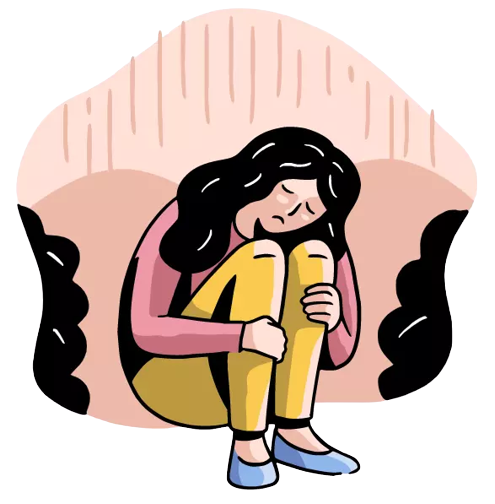Do I have depression?
We all have times when we feel sad, but depression affects our daily life, making it hard for us to find enjoyment in our day-to-day activities. Depression is a mood disorder that can take many forms: some days you may find it impossible to get out of bed, while other days you may feel more able to go about your normal daily tasks.
For some, an obstacle to them seeking help in understanding whether or not they have depression. Before we go into the symptoms of depression, it’s important to point out that if you are struggling with your emotions and feel unable to cope – it could be worth seeking support. You are worthy of help, no matter how trivial you may perceive your problems to be.
Speaking to a professional, whether that’s your GP or a counselor, can help you understand what you need. This can range from self-help tips and breathing exercises, to psychotherapy and/or medication. Everyone is different and will need differing levels of support.

Know More About
Depression
01
Facts To Know
- Depressed people might not look depressed.
- WHO considers depression to be a leading cause of disability worldwide.
- Women are twice as likely as men to be diagnosed with depression.
- Depression can increase the risk of developing other health issues.
- A severe type of depression can cause you to hear, see or believe things that are not real.
02
What Causes Depression?
- Grief -Sadness or grief from the death or loss of a loved one may increase the risk of depression.
- Abuse- emotional physical, physical, sexual abuse can lead to depression.
- Genetics – A family history of depression may increase the risk of depression.
- Brain chemistry
03
Symptoms Of Depression?
- Feeling fatigued most of the time
- Reduced concentration and attention
- Reduced self esteem and self confidence
- Ideas of guilt and unworthiness
- Pessimistic view of future
- Social Withdrawal
- Disturbed sleep & Diminished appetite
- Forgetfulness
04
Treatment
- Medication- Antidepressants are medicines that treat depression
- Talk therapy (Psychotherapy) can help people with depression
- Interpersonal therapy – It aims the patient’s current interpersonal relations and social functioning.
- Psychoeducation – This can range from discussing practical symptoms and possible causes to educate family members.
Recommended Programs For Depression




Best Psychologists For Depression
Consult with the best online psychologist and online counsellor. Select from the best online therapists, psychotherapists, counsellors, and mental health professionals for online counselling. Seek relationship counselling, cognitive behavior therapy (CBT), and online therapy for anxiety and depression. Consult the best online psychologist now.
Depression Online Help
Depression is a word that is widely used but less understood. It is often confused with sadness, anxiety, phobia or stress.
Sadness, feeling down, having a loss of interest or pleasure in daily activities – these are symptoms familiar to all of us. But, if they persist and affect our life substantially, it may be depression. Depression is a mood disorder characterized by persistently low mood and a feeling of sadness and loss of interest. It is a persistent problem, not a passing one, lasting on average 6 to 8 months.
According to the World Health Organization (WHO), depression is the most common illness worldwide and the leading cause of disability. They estimate that 350 million people are affected by depression, globally.
Sometimes physical problems can cause depression. But other times, symptoms of depression are part of a more complex psychiatric problem.
Types or Subtypes of Depression
- Major depressive disorder
- Dysthymia and chronic depression (now called persistent depressive disorder)
- Seasonal affective disorder
- Psychotic depression
- Unipolar and bipolar depression
- Postpartum depression
- Major depressive disorder with seasonal pattern
- Premenstrual Dysphoric Disorder
Causes Of Depression
The causes of depression are not fully understood and may not be down to a single source. Depression is likely to be due to a complex combination of factors that include :
Some people are at higher risk of depression than others; risk factors include:
- Life events: These include bereavement, divorce, work issues, relationships with friends and family, financial problems, medical concerns, or acute stress.
- Personality: Those with less successful coping strategies, or previous life trauma are more susceptible. Genetic factors: Having a first-degree relatives with depression increases the risk.
- A past head injury.
- Having had one episode of major depression : This increases the risk of a subsequent one.
- Chronic pain syndromes : These and other chronic conditions, such as diabetes, chronic obstructive pulmonary disease, and cardiovascular disease make depression more likely.
- Traumatic experience or exposure : Tragic experience or exposure often imprints us with unpleasant and fearful memories which does not allow us to think rationally or practically. For example witnessing an accident, exposure to unpleasant sight, abuse.
- Future uncertainty or negative anticipation : Excessive and stressing in a negative way about future like finance, security, stability, loneliness etc. may lead to depression
- Childhood trauma : Childhood trauma has a significant impact in the overall shaping of cognitive and emotional makeup of a person, which later on become a major cause of mental health concerns and worries in adulthood.
- Disturbed Sleeping and Eating Habits : Unhealthy sleeping and eating routine may make you prone towards the anxiety over a period of time.
- Medical or medicine induced Depression : Chronic illness or serious health condition may lead to excessive worry in terms of finances, health risk, long term medical dependency, side-effects of medicines.
- Work stress : Work life has become one of the major stress creating aspect of everyone’s life, it not only affects the working person but their family due to unavailability, lack of quality time. Prolonged work hours, demanding job, pressure and exhaustion can take an adverse toll on their life.
- Bullying and Harassment : Bullying is prevalent in various organization be it school, college or workplace in different forms. Taking undue advantage, taking employees for granted, constant demotivation and negativity, inter and intra politics becomes a reason for bullying and abuse in various forms. This may result in depression and restless tendencies in employees.
How 2wellBeing online counselling and therapy can help and benefit you to deal and heal your Depression ?
- Awareness of thought and behavior patterns : Knowledge about one’s distorted thought and behavior patterns help to identify, understand and break that chain that contribute to depression
- Healthy coping mechanisms : Through the course of therapy healthy coping mechanisms and personal self care activities are planned and practiced to cope with stressful situations and prevent relapse.
- Positive, productive thought patterns : Client is equipped to consciously gain awareness about their unhelpful patterns of thinking and are armed with tools to challenge these thoughts
- Emotion regulation Techniques are learnt to express and channelize negative emotions in a productive manner thereby increasing positive mood.
Possible Treatments and Therapy to Heal Your Depresion :
- Cognitive Behavioural Therapy
- Psychoeducation
- Lifestyle Modifications
- Creative Therapy
- Goals Management
- Mindfulness & Meditations
- Dialectical Behavioral Therapy
- Acceptance and Commitment Therapy
Try to get the most out of your online counselling & therapy. Keep your appointments. Practice the exercises your therapist gives you. Treatment helps, and without it, you might get worse. Remember, you don’t have to deal with depression on your own. Help is out there.





